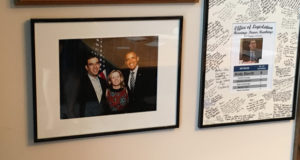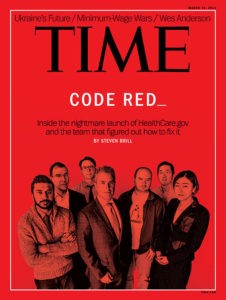Andy Slavitt rode shotgun back to his house while his wife, Lana, drove so he could finish a Twitter thread. This isn’t an uncommon event for Lana, who is also her husband’s scheduler. The Twitter thread was in response to what he saw after paying to see his congressman, Republican Rep. Erik Paulsen, speak at the Bloomington Chamber of Commerce.
Slavitt’s profile has been on the rise in the last three months after his job ended as President Barack Obama’s administrator of the Centers for Medicare and Medicaid Services. In other words, he helped oversee health care in the United States. Since Jan. 20, Slavitt has been a prolific writer – and Tweeter – on health care policy and how to improve the Affordable Care Act. TC Jewfolk sat down with Slavitt, now a senior adviser at the Bipartisan Policy Center, in his Edina home to discuss health care, Jewish values, public service – and whether a run for office is in his future.
When Donald Trump said ‘Who knew health care could be so complicated,’ did you say ‘I did!’?
I just got interviewed for a publication that’s putting quotes in, one sentence only, for Trump’s first 100 days. I think what I said was “Trump is treating the presidency like I treat dieting: He wants the success without doing any of the work.” And I think the reality is, it’s a tough issue. It’s a personal issue for a lot of people. He believed he could navigate it through his great negotiating ability, only to find out that the details are so connected and interrelated. He does reveal himself in those very candid comments. It turns out China and North Korea is complicated and there’s some history there. You know who knew? The people who were briefing you in the transition. All of this stuff was in our transition materials. 100 percent of it. If he paid attention.
What is it about health care as an issue that makes it so complex?
It’s a cottage industry. We bring our belief systems to it. ‘I believe the free-market is the solution to every problem’ or ‘I believe the government should solve every problem.’ And yet, it’s a giant cottage industry. It’s a $3 trillion cottage industry.
No. 2: Consumer attitudes towards health care are unlike anything else. By that I mean people don’t think about health care at all until it’s the only thing they think about. Most people, it’s scary for them to think about their health. They don’t necessarily want to pay for it or think about it. They may or may not want to do things that keep themselves healthy. But then when something happens, if they get cancer or something like that, it overwhelms their entire life.
The third thing that I think is most complex and most interesting is the health equity issue. What we are capable of if we gave everyone in this country access to the care that the people with means and resources get, we’d have a great health care system. But health care is so complicated by other social determinants that prevent people from getting care. It’s about education, housing, transportation. Many other issues. You can’t solve the problems in health care without looking outside at how people live and addressing the issues.
 At noon on Jan. 20, you were out of a job. Why have you stayed involved in the fight to save ACA rather than go into the private sector?
At noon on Jan. 20, you were out of a job. Why have you stayed involved in the fight to save ACA rather than go into the private sector?
It doesn’t matter where I sit. I’m as dedicated to the issue now as I was then. In that job – I realized early – was that you have 130 million American’s health care relying on the Medicare, Medicaid or ACA programs. The vast majority are on fixed or low incomes. Those aren’t imaginary people. The first thing I would do every day was read emails from Medicare and Medicaid beneficiaries to understand what goes on in their world. We’re making progress as a country. For the first time in decades. We’re pushing forward to reduce the cost of health care and give people the protections they need. I’m unwilling, as long as I can be a part of the discussion and the dialogue, to let that go away and be someone else’s problem.
Does watching the president and his party try to undermine and destroy what you’ve done hurt personally?
On one hand, it’s not at all personal to me. My sense of this is that it’s for the country. The president doesn’t embody the country. We as people embody the country. It’s not my work; it’s the work of decades to build up. Where it feels personal, is that it should feel personal to everybody. It’s not the only issue that should be personal to people; immigration should feel personal to people; all of the things we watch that impact our neighbors, impact our society. We better start taking it personally, because if you wait for the issue to impact you personally, it’ll be far too late.
Do you see a particularly Jewish value in health care and the struggle to maintain and improve?
I think most of us who are Jewish have an embedded notion of Tikkun Olam inside. People don’t always get it from religion; you don’t have to believe in God to believe in that concept. But my parents raised me that way and we raise our kids that way, with that perspective. In our family, when the ACA got into trouble and I spent the last three years commuting to D.C., it was very much a family value. We have a very close family. There was nothing else I could think of other than service that would cause me to spend three years commuting back and forth while my boys were in school. It doesn’t necessarily feel like you’re doing for religious reasons, but you sort of develop the person you are based on the influences around you.

Andy Slavitt, second on the left, was part of the team that salvaged the HealthCare.gov website after launch.
Did you consider yourself someone who wanted to work in public service in this way?
It probably doesn’t surprise people who have known me for a long time. But this certainly wasn’t something I was looking for or seeking out. We’ve tried to do everything we do with an eye on what’s the greater good or greater purpose. I loved it. It was an incredible honor to wake up every day and do something that would matter. Even if there was some terrible stuff and you could make it a little less terrible. Or you can do something that could change people’s lives forever. The big things people talk about – reducing the uninsured rate, changing how health care is paid – are visible to everybody. The daily singles and doubles of the job impact whole communities.
People see too many issues as purely Democrat or Republican. One thing we learned was that people won’t vote for a bill just because it’s your party’s bill. It’s got to be a good bill.
I also send out flattering tweets to Republicans who have taken courageous votes. We’ll see how this plays out because it’s not over yet, but it could be that content and facts win out at this point. This was a bill that was presented with a disregard for the normal process: a lack of public hearings and a lack of facts.
I’ll tell you what I said when I left office: We should have no pride of authorship; we should take all good ideas so long as they meet four tests: Help get people covered; Reduce the cost of care; Cover health care more comprehensively; We do it in a fiscally responsible way. Anybody, Democrat or Republican that comes up with ideas that can improve the ACA or any part of health care from where are now, we should embrace those ideas. We can’t live in a world where one party or the other owns health care and the other has free reign to criticize. I’m awfully proud of what President Obama accomplished over the last eight years, but it wasn’t good for the party or the country to own the issue on its own. I think Republicans are learning the same thing. I have a lot of conversations with Republicans on [Capitol] Hill and in state houses every week, and I hear a similar sentiment. I think many reasonable people behind the scenes are saying the same thing. It’s better to take half-a-loaf that everybody owns than a full loaf that one party owns. I’m not viewing this issue through a partisan lens. But I’ll call bad bad. This bill is horrible and I’ll call it horrible. But it’s not partisan horrible; it’s [horrible] because it hurts millions of people and leaves them out in the cold. I’ll call it like I see it. At the end of the day, health care should be more personal than partisan.
You were at the Rep. Erik Paulsen’s event this morning. Do you have plans to run against him?
No, I don’t. But I will be helpful in finding a good candidate that will run against him. One of the misconceptions about Paulsen is that he is anything but a radical right-wing politician because he’s sponsored some bi-partisan legislation. What people really need to understand is, at the end of the day, Apple’s products are phones and computers and politicians’ products are their votes. His votes are the same as Jason Lewis’s and Tom Emmer’s. People have the perception that we’re represented in this district by a moderate and we’re not.
He’s smart enough to know that [the American Health Care Act] would hurt a lot of people in his district. That’s what he’s got to demonstrate. If he doesn’t, then whoever runs against him will have an easier time of it. If he changes his posture and actually represents the people who elect him, I think it’ll be a different race.
There are independent minded people who believe in things I don’t agree with but I have some respect for them, and I dealt with them all the time. It was easy to begin a conversation with those folks and say we aren’t going to agree on this issue, but let me tell why I’m coming to the decision I’m coming to from an administration level, and he or she would say ‘let me tell you what I’m hearing from constituents. You can have a great relationship with someone like that.
Everyone who spoke about health care was dead-set against the vote he took. If I were him, I would say ‘let me think about what I heard this morning.’ He has to have been surprised. We came to it because it was the only chance for people to hear him.
Do you have a candidate in mind?
No. It’s not just this race; I’ve been trying to help in other races. I’ve been appearing at other town halls; I’ve done Facebook town halls. I want people to be accountable for their votes. I want candidates across the country to actually do their town halls and face their constituents. I want to help candidates from a policy perspective or any other way. We have a big governor’s race coming up. It won’t be long before presidential candidates declare. I’m not going to be sitting on the sidelines. None of us should be sitting on the sidelines because people are casting votes for issues that should be important to all of us. There’s accountability for those votes.
Are we going to see your name on a ballot anywhere?
Not as far as I can tell. We have plenty do.

